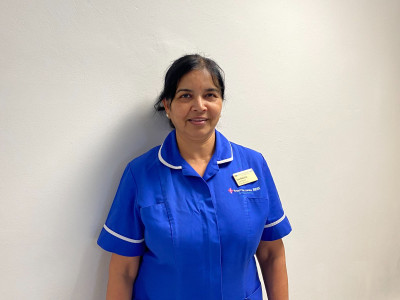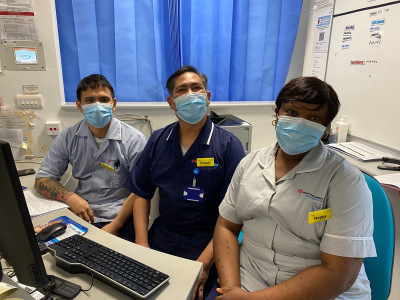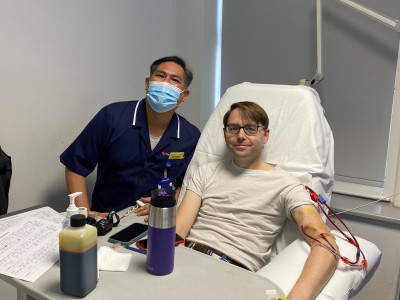Thursday 14 March is World Kidney Day, aiming to raise awareness of kidney health and educate the public on various options available to them for kidney failure. At the Royal Free London (RFL), organ failure and transplantation is one of our three group-wide clinical priorities. Our renal services team provides a range of treatments to patients with kidney problems and kidney failure. One of those teams is based at the kidney and diabetes centre on the grounds of St Pancras Hospital, who you can read more about below.
Located on the grounds of St Pancras Hospital is the unassuming Kidney and Diabetes Centre which provides crucial care to over 200 patients a day. Across its two floors you will find 34 staff who care for patients on dialysis – the process of removing excess water and toxins from the body, simulating the work of the kidney.
Ida Rebello, lead nurse for frailty/dialysis, heads up the nursing team at the unit, also known as the Mary Rankin Dialysis Unit, having first begun working for the RFL in 2002. At first Ida had no interest in working in dialysis nursing, but soon grew to love the area.
“After my graduation I seemed to just fall into dialysis as that is what was allocated to me,” Ida says. “Initially I wanted to work in a medical ward so that I could look after patients who were really unwell, but eventually I started to get to know dialysis patients more and I really started to enjoy it.
“We see patients more than we sometimes see our own family and friends. We get to know them, and their situations and difficulties. There is something new when I speak to them every time, whether that is financial difficulties or family difficulties, and I can hopefully help them with that.”
The unit sees hundreds of patients a day across three different time slots – morning, afternoon and twilight. Downstairs there are two bays with 15 beds in each.

Ida Rebello, lead nurse for frailty/dialysis.
“We have a mix of ages, from 18 right up to 91,” Ida explains.
“Some patients are frail and others can manage independently. We have quite a lot of stretcher and wheelchair patients who we mainly dialyse in the afternoon so they can rest in the morning. Transport has a part to play there, and I attend the transport meeting every Tuesday to present how transport has gone in the previous week. We do not want to have incidents where we delay a patient going home."
Raymond Chinehasha is senior charge nurse and looks after the three sessions of outpatient dialysis.
“Patients come in on either Monday, Wednesday and Friday, or Tuesday, Thursday and Saturday, and we are closed on Sunday, but some patients might be healthy enough for just two slots a week which gives more capacity.
“The first thing I do is look at the following day, making sure that we have enough staff. I also look at patients who have gone for a procedure and we have to slot them in in some way, making sure we have enough consumables – fluid, catheters and needles – and that the machines are okay. No two days are the same and you get different things thrown at you all the time.”
The team also works closely with services at Barnet Hospital, Edgware Kidney Care Centre and Tottenham Hale Kidney Centre.
“Where you go depends on your postcode,” Raymond says. “If there isn’t a slot available to accommodate you, you go to where there is one and then eventually you get transferred in. Patients first might think it is too far, but they settle in and by the time I let them know there is a slot available closer to their home they don’t want to go!”

Merwin Puri, assistant practitioner, Franel Ave, senior charge nurse, and Happy Aimurie, nursing assistant.
Upstairs, Franel Ave, senior charge nurse, leads the unit’s self-supported care service. This is suitable for some patients, giving them the opportunity to have more flexibility and independence in their care.
After receiving training, patients in the unit are able to carry out some or all of their dialysis treatment themselves, giving them greater flexibility and reducing the amount of time they spend at each treatment.
Franel, who joined the trust in November, is also being tasked with expanding the unit’s home haemodialysis.
“At the moment we have seven patients on home haemodialysis, and we are looking at how we can increase that,” he explains.
“We have a pathway to follow to determine which patients are suitable, and a huge indicator is if the patient inquires about it or is engaged with early conversations.”
If the patient progresses on the pathway, a checklist is carried out on their home to ensure it is suitable for the machine and regular stock deliveries.
“The majority of our patients live in flats, so suitability with the size of the machine is really important,” Franel says. “If they pass all of that, we train them for six to eight weeks, and in the background the technical group do the installation at home. That means when they are signed off, a date can be set for them beginning home dialysis.
“For the first few weeks, we usually visit them at home and continue with monthly bloods to make sure they are dialysing properly. We also set up an in-centre session to check their technique and one-to-one discussions about any concerns they might have.”
Patrick Anderson is one patient who carries out self-supported care.
“It’s a great unit,” he said. “It’s small enough that you don’t feel like a number or that you are in a dialysis ‘factory’, so to speak. This is a close-knit team and you see the same people.
“I come in twice a week and the whole process from start to finish lasts about four hours. The ultimate goal is to do this at home. I can have more control and more involvement in my care and not have to schedule my life around coming here.”

Franel pictured with Patrick Anderson.
Looking ahead to the future, Ida is hopeful about the outlook for the team.
“With NHSE funding we have already recruited a member of staff for two years who is going to concentrate on home dialysis to further establish it,” she explains.
“I also want to continue focusing on staff wellbeing. We have seen some great improvements in recent years in that area, and staff also have the tools to cope with sometimes difficult situations.
“If we support staff and their morale is good, I always think patient care is better, which is our ultimate goal.”
 Translate
Translate